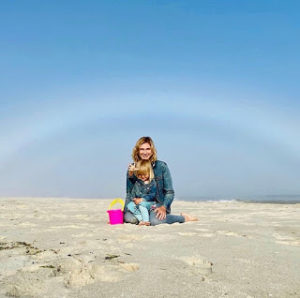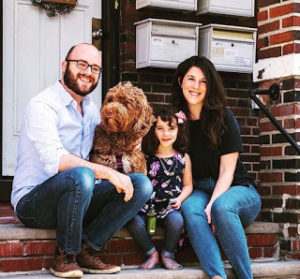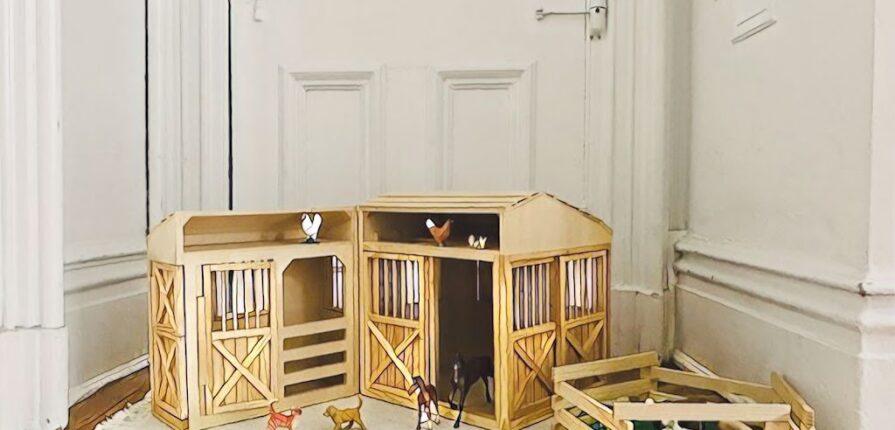“The environment must be rich in motives which lend interest to activity and invite the child to conduct his own experiences.”
― Dr. Maria Montessori
Welcome to HPMS at Home
Thanks for stopping by!
The teachers at Hamilton Park Montessori School have opened their doors to show you how they bring Montessori out of the classroom and into their homes, their parenting, and their lives.
Here, you will discover ways of using the Montessori method to inspire you to:
- Set up your home environment
- Parent through a new lens
- Approach life to promote respect, creativity and discovery
Without further ado, let’s meet a few of our teachers…
Ms. Hala
Why did you choose to become a Montessori teacher?
Montessori was a part of my upbringing. When I was two years old, my parents learned about the Montessori method and soon after, they opened a Montessori school in our home. Each room of our house was transformed into a Montessori environment and my mother and father were building and creating materials night and day. Instead of a dining room table, we had Montessori Bells, a piano and various instruments. Instead of a sofa and television, we had shelves with beautiful Sensorial and Math Materials. There was a room filled with Practical Life and art materials that extended outside and our living room was lined with shelves containing books, language, science, and culture materials. The school grew and eventually moved out of our home. I stayed in my family’s Montessori school through 6th grade.
Growing-up with two younger siblings and dozens of other children in such a unique home environment, paved the way for me. I veered off that path to pursue other interests in my young adulthood and found myself at a fork in the road… choosing between pursuing a career in fashion or a career in teaching. Montessori had been engrained in me so deeply and connecting with children came naturally that I guess I had never viewed teaching as a career until then. So, I chose to continue my journey down the path that had been paved by my parents to learn more and grow further as a Montessori teacher. And, I haven’t looked back.
How old is your child? When did you begin using the Montessori method at home with your child?
I always knew that I would use the Montessori method at home and in my parenting from before the time Matilda was a twinkle in my eye, she’s two now.
I read several books, as all expecting mothers do. I was only dreaming about preparing a Montessori infant environment, when Matilda surprised us 6 weeks early! We had nothing ready! After the initial shock wore off (which took several weeks) I remembered to embrace the most important lesson I’ve learned as a Montessori teacher, which is to observe.
That is when I began using Montessori in my home, as a mother. I prepared her environment and made adjustments according to her needs. I feed her, carried her, slept alongside her, dressed her, I engaged with her in ways that best supported her development. These were not conventional ways of caring for a baby that I read about in books, or things I had been told to do by friends or family. I cared for my baby in the way that best suited her individual needs.
What do you like best about the Montessori method?
There is a great deal of respect and support that is exchanged in a Montessori classroom.
The teachers respect that each child has their own way of learning and their own rate of learning and the materials are designed and arranged to support that. Each child is viewed as a whole individual with their own interests, strengths, and areas in which they may need support. They are given the time and space they need to make discoveries and master their skills. Therefore, there is no pressure put on the child to do what their peers are doing and there is nothing holding them back from exploring and deepening their interests. With that, they maintain the appetite for learning that they were born with.
The children are responsible for respecting their own learning through exploration of the materials and lessons with the teacher. They learn that each living thing and object in a Montessori classroom has a purpose and a place and although every child is viewed as an individual, they also learn that they are a part of a community. They learn that it is their responsibility as a member of their community to respect and take care of their environment, to take care of themselves, and to respect and care for others.
How do you bring the Montessori method home?
I embrace the Montessori philosophy as much as I can in how I communicate with my family, how I arrange the furniture and objects in our home, and how I approach my responsibilities in caring for our household. This does not come without challenges and these are areas of my home life that I continue to work on everyday.
How have you adapted the Montessori method of teaching into your parenting?
I try my best to calmly and respectfully approach all interactions with my daughter. I am gentle and as she is developing her expressive language, I listen to her, give her opportunities to make her own choices, and I observe times when she might need my help. I offer help first, without jumping in, because I want her to have the opportunities she needs to concentrate and practice on her own.
I have arranged areas in each room of our home that maximize opportunities for Matilda to develop her independence. Each object has a purpose and a special place, however I make changes as she grows, depending on her needs and depending on what skills she is working on developing.
Ms. Kristi
How old is your child and when did you begin using the Montessori method at home?
Stella Bird is 4 years old and Montessori philosophy has inspired my parenting from day one — but it hasn’t been perfect! Montessori is more of a lifestyle than a method to me. What I love about bringing Montessori into the home is that there aren’t any rules. It’s all about following your child and doing what is best for your family at the time. Things shift and change and as parents, we need to adapt. There’s no such thing as a perfect way or perfect parent and that resonates with me.
Why did you choose to become a Montessori teacher?
I knew from childhood that I wanted to teach. I am the oldest of 6 and used to play “school” with my siblings. “Choose” might be the wrong word for my story — I fell into Montessori like a beautiful accident. I had just graduated with a degree in Visual Arts Education and I was looking for a job. At the time, HPMS happened to be looking for an Art Teacher and I was invited to observe in the classroom and interview. I had never seen anything like it–children moving freely through the bright classroom, the hum of busy children working, soft-spoken teachers giving lessons to individuals rather than the whole class, everything organized and within its place–and it felt like a calling. That was 13 years ago and the rest is history!
What do you like best about Montessori and how do you implement it at home?
There are really three elements of Montessori that speak to me the most and inform how I make most of my parenting decisions. First is having respect for my child. I try really hard to create a beautiful and inviting space for Stella to play in and we try to include her in the decision-making process. This makes her feel valued and in turn, she knows she is a contributing member of our family. I do my best to always speak with a gentle and loving tone and in words she can understand. I also respect Stella’s individual development and I don’t compare her to other children her age. Secondly, I have a strong need for order and this element of Montessori speaks to that. When my home is in disarray, so is my mind. My family is so much happier living in an environment that is organized and simple. It’s been a journey over the last couple of years and a work in progress but everything has a special place, which makes cleaning up a breeze. Lastly is instilling a strong sense of independence. I do my best to allow Stella the space and time to try things on her own, without intervention. She is fierce and confident, but now we are working on helping her play independently. She gets a lot of our attention as an only child!
How does teaching using the Montessori method and parenting using the Montessori method differ?
Well my students listen to me, and my child doesn’t, for one. However, in all seriousness, I don’t think they are really much different. Becoming a parent really made me want to be a better teacher. Being a Montessori educator for almost a decade before becoming a mother has been the most valuable gift. It opened my eyes to how joyful parenting can be. Don’t get me wrong, it’s not always rainbows and unicorns. But there is beauty within every moment–even the difficult ones. Teaching my students comes naturally to me. It is one of the great joys of my life. I live to see the smile of a student who has poured their very first glass of water without spilling a drop or witness the quiet concentration of a child counting math beads. However, experiencing these moments with your own child, who you love like no other person on the planet, is something incomprehensible. It makes my heart want to burst out of my chest.
What challenges have you faced as a parent that the Montessori method has helped with?
The biggest parenting challenge Montessori philosophy has helped me through is reminding myself to take a step back and just observe. As a working mom, I’m always on the go and Stella is sometimes along for the ride. However, when we have an issue to work through, I remind myself to watch–or sometimes I freak out, and then I remember to watch! Observation can tell us so much about what our child actually needs. So I ask myself, “What is Stella really trying to tell me through her whines and cries? Does she need more time? More space? Shoes with velcro instead of laces? Fewer toys to choose from? To throw something outdoors? A hug? My undivided attention in this moment? Observation is a crucial element of Montessori philosophy and it may be arguably the most important. Young children don’t have the emotional capability to tell us exactly what they need with their words. They use their actions–we just have to listen.



